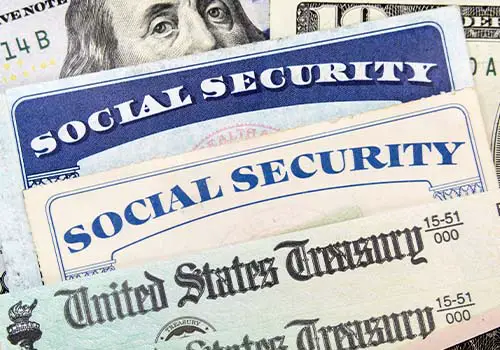People can become disabled at any age, and many young adults who receive disability benefits also have children to provide for. Having enough money for basic expenses can be difficult, but providing for a child can make things even more challenging. Your child might also qualify for Social Security benefits if you receive a disability check.
If your child is eligible, the amount they receive will depend on a few factors. A child’s benefit amount will depend on your monthly benefit amount plus the number of family members who are eligible to receive benefits. If you have a child and receive disability payments, then keep reading.
We will tell you how your child can also qualify for benefits as well as how much they can expect to receive.
How A Child Can Qualify For Dependent Disability Benefits
Some eligibility criteria must be met before your child qualifies for Social Security Administration benefits. Just because you have a condition that qualifies for Social Security disability benefits does not mean that your child will automatically receive benefits as well.
Here is how your child can qualify for benefits.
- The child must have a parent who is either retired or disabled and entitled to Social Security benefits.
- Not only can your child qualify for benefits if you receive disability, but they can also qualify for benefits if you receive Social Security retirement benefits. They can also be eligible for benefits if they have a parent who died and worked at a job where they have enough Social Security work credits to qualify for benefits.
- The child must generally be under 18 years old to qualify, although a few exceptions exist.
- A child between 18 and 19 can qualify as long as they are a full-time student at an elementary or high school (grade 12 or below). An adult child can also be eligible for dependent benefits if they have a disability that started before the age of 22.
- While biological children will always qualify for benefits if they meet the criteria above, the child does not always have to be your biological child to get benefits.
- Sometimes, a stepchild, grandchild, step-grandchild, or adopted child can qualify for benefits. Regardless of the relationship, you will need the child’s birth certificate and Social Security number to enroll them in dependent benefits.
A disabled child might be able to qualify for children’s Social Security benefits even if their parent does not receive disability benefits. A disabled child can be eligible for Supplemental Security Income (SSI) benefits if their household income and resources are below a certain threshold. A child does not need an earnings record to qualify for SSI benefits, but your household must meet the low-income requirements.
When you apply for disability, your child does not automatically receive benefits.
You will need to apply for dependent benefits for your child.
- You will need the child’s birth certificate, social security number, and parent’s SSN.
- In some cases, other documentation might be required.
You can apply for benefits for your child online, although if you cannot complete the online application, a visit to your local Social Security office might be necessary.
Calculating Social Security Disability Benefits For Children

So, how much will your child receive each month if you receive Social Security disability insurance or SSDI benefits?
The amount of Social Security disability benefits for dependents depends on how much the parent receives. As you likely already know, the parent’s benefit amount is based on their earnings record. This calculation applies to both disability benefits and retirement benefits. The disabled parent’s monthly benefit amount will be based on their Average Indexed Monthly Earnings or AIME.
This means that your benefit amount is calculated based on your earnings while working. The more you earn at your job, the higher your benefit payments will be.
A dependent child can receive up to 50% of the parent’s monthly benefit.
For example, suppose you get an SSDI check each month for $2,000. Your qualifying child might receive a check each month for $1,000 in that case. If the child is your only family member receiving benefits under your work record, they will likely receive the full benefit.
However, if you have multiple children receiving benefits, then each child’s benefit amount will likely be reduced to account for the family maximum. We will discuss the family maximum in more detail later in this article.
KEY TAKEAWAYS
- A dependent child can receive up to 50% of the parent’s monthly benefit amount.
- The maximum benefit per family is usually 150% of the primary insurance amount up to 180% in some instances.
- Generally, children’s benefits stop when a child turns 18, but under certain conditions may continue beyond age 18.
When Do Dependent Benefits Stop?
If your child receives benefits each month, you might wonder when those benefits will end.
A disabled person will want their child’s benefits to continue as long as possible to help provide financial support to that child.
In most cases, Social Security children’s benefits stop when the child turns 18. However, a couple of exceptions can allow the child’s benefits to continue past age 18.
- If the child is a full-time high school or elementary student, their benefits can continue until the child turns 19.
- Unfortunately, full-time college students are not eligible for continued benefits. In this case, the child’s benefits will stop when the child graduates or two months after the child turns 19 — whichever comes first.
These extended benefits can help, especially if you want your child to finish high school.
A disabled child might be able to receive benefits even beyond their 19th birthday. Disabled adult children can continue to receive dependent benefits into adulthood as long as the child’s disability begins before age 22.
In some cases, these disabled children can receive benefits for their lifetime. Even after the parent dies, the child’s disability benefits can usually be switched over to children’s Social Security survivor benefits.
Switching from dependent benefits to survivor benefits can get complicated, so you might need help from a disability lawyer to navigate that process.
Must read articles related to Disability
- A complete guide on “How to Apply for Disability“.
- Learn more about what conditions qualify for disability.
- A complete guide on “How to Apply for SSI“.
- Discover if Social Security disability is taxable.
- Learn about child disability benefits.
Disabled Parents & The Maximum Family Benefit

We have already mentioned the maximum family benefit, but what exactly is it?
The maximum family benefit is the maximum amount that the Social Security Administration (SSA) will pay to a family each month based on the earnings record of one individual.
Remember that we said earlier that a child could qualify for up to 50% of the disabled parent’s benefit amount. Suppose a disabled person had six children who each qualified for dependent benefits. Sometimes, that person might also have a spouse who could qualify for spousal benefits. It might appear that the Social Security Administration would owe the family over 300% of the primary beneficiary’s benefit amount each month.
The maximum family benefit would prevent the monthly payment from being that high. In general, your maximum family benefit cannot exceed 150% of your primary insurance amount, although this amount can increase to 180% in some cases.
This means that one child essentially maxes out your family benefits. Suppose a disabled parent receives $2,000 monthly in benefits but has two children who qualify for benefits. Each child would not be eligible for $1,000 per month. Instead, each child would likely receive $500 per month. The dependent benefit will typically be split equally among all children or dependents who qualify for benefits.
Even though the family maximum is usually 150% of the primary insurance amount, a few other rules also apply.
- The maximum benefit will never fall below your primary insurance amount. This means that your benefits will never be reduced due to family members receiving benefits.
- Benefits paid to an ex-spouse will not count toward your family maximum.
- The family maximum can never exceed 85% of your AIME. In most cases, 150% of your monthly benefit is less than 85% of the total amount of your AIME, so this rule rarely comes into play.
TIP
Child may qualify for benefits if you receive disability, but can also qualify if you receive Social Security retirement, or survivor benefits.
Can Children Receive Benefits If A Parent Receives SSI?
Yes, a child can receive benefits if a parent gets SSI. The rules on SSI for children are essentially the same as the rules already described for SSDI benefits.
- The child can qualify if they are under 18 and the parent receives SSI benefits.
- Similarly, children between the ages of 18 and 19 can receive benefits if they are full-time high school or elementary students.
- Biological children qualify, although stepchildren, adopted children, and grandchildren can also qualify. This means that grandparents caring for their grandchildren might be able to get benefits through Social Security.
The same rules also apply regarding the maximum family benefit. In most cases, the amount a parent receives from SSI will be lower than the average SSDI or Social Security retirement benefit payment.
- A child usually only qualifies for 50% of the parent’s benefit amount. So, if the parent receives $600 per month, the child might be able to get $300 per month.
Even if the parent has multiple children, the family can generally receive no more than 150% of the parent’s Social Security benefit amount.
The Bottom Line
If a parent is on disability or receives retirement benefits through Social Security, a child can also qualify for benefits. In most cases, the child can receive up to 50% of the parent’s benefit.
However, there is also a family maximum benefit amount. A family can receive no more than 150% to 180% of the primary insurance amount, regardless of how many children or dependents are eligible for benefits.
A child’s benefit will stop at age 18 unless the child is a full-time student in elementary or secondary school. In that case, the benefit will continue until the child graduates or until two months after the child’s 19th birthday.
Frequently Asked Questions
Yes, your child can get a monthly payment if you receive disability benefits. They must be under 18, and stepchildren or adopted children can also qualify for the benefit. If the child is a full-time student in elementary or high school, they can continue to receive benefits until they turn 19.
The child will generally be eligible to receive 50% of the parent’s monthly benefit, although the maximum family amount is 150% to 180% of the primary insurance amount. If multiple children are involved, the dependent benefits will be split equally among the children to remain under the family maximum.
The amount your child receives depends on the amount of the parent’s monthly SSDI payment.
Your child will typically be eligible for 50% of the parent’s benefit amount. So, if you receive a disability payment each month of $1,000, your child will likely be eligible to receive $500 each month.
The numbers begin to change when multiple children are involved. Suppose you have two children in the example above. Each child would not receive $500. Instead, that benefit would be split between the children so that they each receive $250 per month.
The more children you have, the less each child will receive each month.
The payment schedules may vary slightly from one program to the next. However, you will generally get paid monthly for caring for a family member.
Remember that most Medicaid programs pay on an hourly basis. Your time must be properly logged and submitted to the program. They will usually provide payment each month based on the hours from the previous month.
Some programs might offer payments twice per month, but a monthly payment schedule is more common.
The most significant difference between SSI and SSDI is that you must have a work history to qualify for SSDI benefits. SSDI, or Social Security Disability Insurance, covers workers who have paid Social Security taxes into the system while working. If they become disabled, their benefit amount is based on their prior earnings history.
SSI benefits are available to low-income disabled individuals. No work history is required to qualify for SSI, although the average payments are much lower than SSDI payments.
The SSI program helps provide financial assistance to disabled parents who cannot work and earn money for their families. SSI can also provide payments to the children of a disabled parent to help provide financial child support to those children.
In addition, the family might also qualify for Medicare or Medicaid benefits for health insurance coverage.
The SSI program can also qualify these individuals for other important government assistance programs, such as free school lunches, a free cell phone, housing assistance, and other great benefits.
You can find a Social Security Administration office near you by using our SSA office locator and searching for your closest location.





